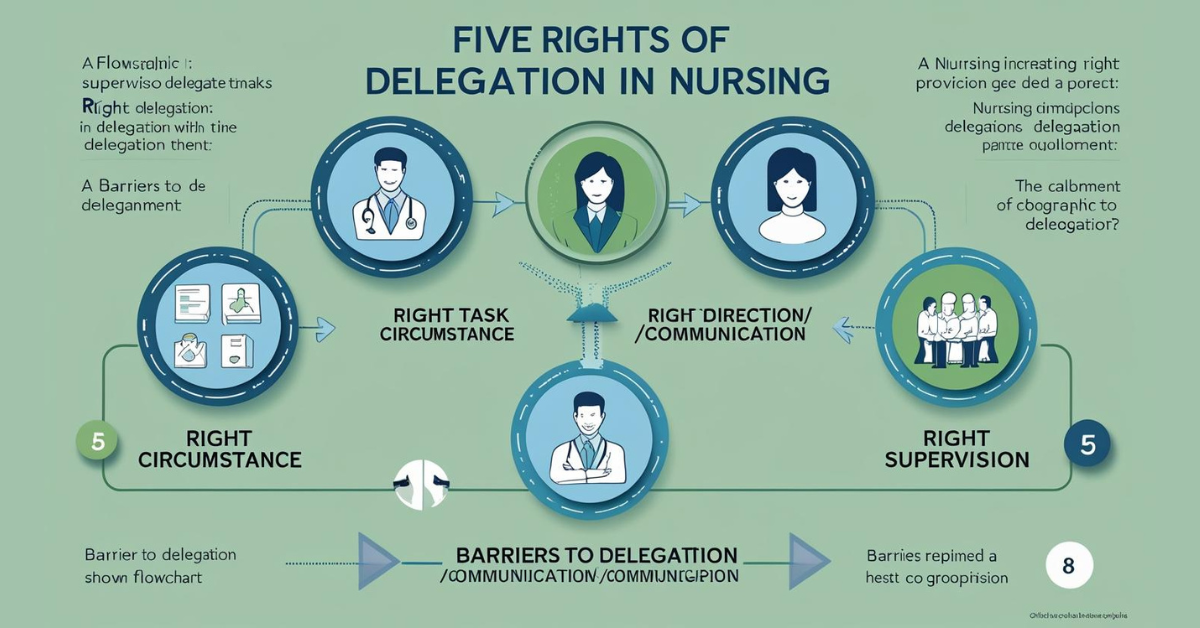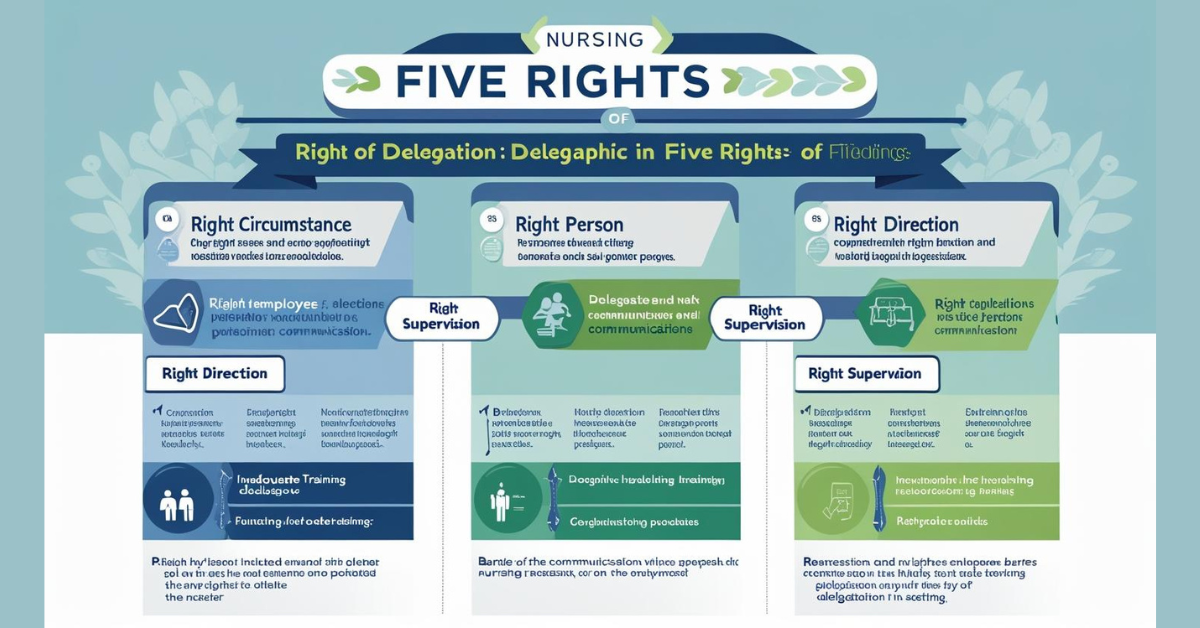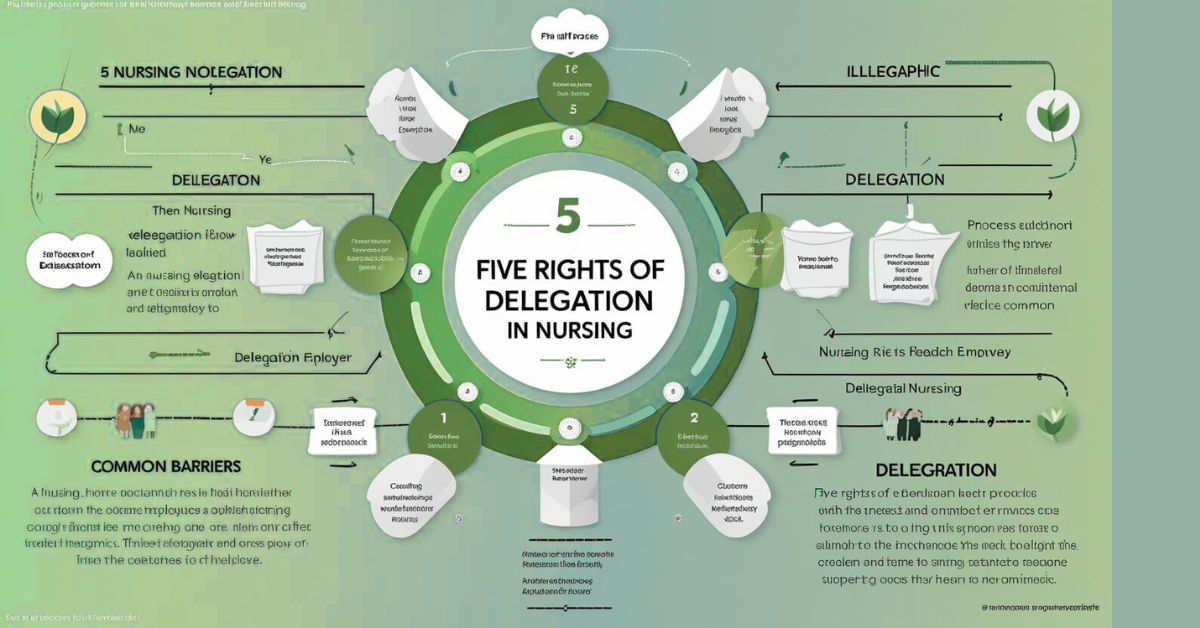Now a day Five Rights of Delegation Its Process and Barriers In Nursing. Obstacles to successful delegation include poor collaboration, unhealthy attitudes, and a lack of team spirit.
The Five Rights of Delegation Its Process and Barriers In Nursing
In nursing, the “Five Rights of Delegation” provide a framework for safe and effective task assignment. They ensure that the right task is delegated to the right person under the right circumstances, with appropriate guidance and supervision, and with appropriate evaluation. Barriers to delegation include lack of self-confidence, fear of responsibility, and inadequate communication.
The Five Rights of Delegation
Nurse leaders and managers must work collaboratively with staff nurses to maintain the integrity of patient care (NCSBN, 1997). The five rights of delegation can be used as a guide for nurses to clarify critical elements of the delegation decision-making process: The right task is assigned to the right person under the right circumstances with the RN providing the right direction or communication and the right supervision. The five rights of delegation delineate accountability for nurses at all levels.
Right Task
In the nurse’s best judgment, the right task is one that can be safely delegated to a specific delegate for a specific patient. Appropriate activities for consideration for delegation include those that (NCSBN, 1997):
- Frequently occur in the daily care of patients
- Are within the scope of practice of the LPN or LVN
- Do not require the UAP to exercise nursing judgment
- Do not require application of the nursing process
- Do not have risks that are predictable or beyond minimal
- Use a standard and unchanging procedure Nurse leaders and managers are responsible for ensuring that appropriate activities for consideration in the delegation process are identified in the LPN or LVN and UAP job description. In addition, nurse leaders and managers must describe the expectations and limitations of activities in organizational policies and procedures and in standards of practice (NCSBN, 1997).
Right Circumstances
When delegating, the nurse must consider the patient setting, available resources, and other relevant factors. Effective delegation requires the nurse to assess the status of patients, analyze the data, and identify patient-specific goals and nursing care needs. In addition, the nurse must match the complexity of the task with the competency level of the delegate and the amount of supervision needed.
Nurse leaders and managers are responsible for assessing the needs of the patient population on the unit or department and identifying collective nursing care needs, priorities, and resources. Further, ensuring appropriate staffing and skill mix, as well as providing sufficient equipment and supplies, is critical for effective delegation.
Right Person
It is important for nurses to know the competency levels of those on the patient care team to delegate on an individual and patient-specific basis. Nurse leaders and managers must establish organizational standards consistent with state laws to ensure educational requirements and competencies of RNs, LPN or LVNs, and UAPs. Nurse leaders and managers should ensure that competence standards related to delegation are integrated into organizational policies and should assess RN, LPN or LVN, and UAP performance routinely.
Performance evaluations should be based on standards, and nurse leaders must initiate steps to remedy any failure to meet standards (NCSBN, 1997). Further, it is inappropriate for nurse leaders and managers to require nurses to delegate when, in the nurse’s professional judgment, delegation is unsafe (NCSBN, 1995, p. 2).
Right Direction or Communication
Communication is critical to effective delegation. The nurse must provide a clear, concise description of the task, including its objective, limits, and expectations (NCSBN, 1995). Communication between the delegator and the delegate is essential to safe patient care. Situation-specific communication includes the following (NCSBN, 1997, p. 24):
- Specific data to be collected and method and timelines for reporting
- Specific activities to be performed and any patient-specific instruction and limitations
- The expected result or potential complications and timelines for communicating such information Nurse leaders and managers are responsible for communicating acceptable activities, competencies, and qualifications of all staff members through standards of practice, role descriptions, and policies and procedures (NCSBN, 1997). Further, nurse leaders and managers must facilitate open communication with all staff members and encourage them to express concerns or refuse an assignment, without fear of reprisal, if they believe that they do not possess the required skills needed to perform the task safely (ANA, 2015a).
Right Supervision or Evaluation
The nurse provides feedback to the delegate as well as appropriate monitoring, evaluation, and intervention as needed. The nurse may supervise the activity or assign supervision to another licensed nurse. The nurse must provide specific directions and clear expectations of how the task is to be performed; in addition, the nurse should monitor the performance, obtain and provide feedback, intervene if needed, and ensure proper documentation (NCSBN, 1997).
Finally, the nurse must evaluate the entire delegation process and provide feedback to all involved, including the patient. Nurse leaders and managers are responsible for ensuring that ad equate human resources are available to provide for sufficient supervision. Nurse leaders and managers also must evaluate the outcomes of the patient population and use information to develop quality improvement programs and risk management plans (NCSBN, 1997).
The Delegation Process
Whatever the task that is delegated, decisions must be made with the goal of delivering safe and quality patient care. As mentioned earlier, the nurse must assess the knowledge, skill, and experience of the delegate, as well as the following (Snyder, Medina, Bell, & Wavra, 2004, p. 10):
- Potential for harm: The nurse must determine how much risk the activity can cause the individual patient.
- Complexity of the task: The more complex the task, the less desirable it is to delegate. Only an RN should perform complex tasks.
- Amount of problem solving and innovation needed: Activities that require special attention, adaptation, or an innovated approach should not be delegated.
- Unpredictability of outcome: It is not advisable to delegate an activity if the patient’s response is unknown or unpredictable.
- Level of patient interaction: The nurse should avoid delegating activities that may interfere with the nurse’s developing a trusting relationship with the patient.
Delegation is a complex but necessary process requiring skill in clinical judgment to accomplish safe and effective nursing care in a timely manner. The delegation process includes assessment and planning, communication, surveillance and super vision, and evaluation and feedback. Delegation is based on patient needs and available resources. During the assessment and planning steps of the delegation process, the nurse plans for care and specifies the knowledge and skills required to accomplish the task (ANA and NCSBN, 2006).
The nurse determines whether there are any cultural modifications needed, whether the patient’s condition is stable and predictable, and whether the environment in which care will be provided is stable (Duffy & McCoy, 2014). Next, the nurse develops a plan of care with the patient and his or her family. If the nurse determines that patient needs will be met without jeopardizing safety, then the nurse will proceed to the next step. Clear directions must be given to the delegate, including unique patient information and expectations regarding what to do, what to report, and when to ask for assistance (ANA and NCSBN, 2006; NCSBN, 2005).
Communication must be a two way process, with the nurse assessing the delegate’s understanding of expectations and providing clarification if needed. Communication should be mindful (Anthony & Vidal, 2010). Mindful communication is an active process in which those involved are focused on attending to, responding to, and perceiving information. In mindful communication, information is continually analyzed and categorized, thus allowing for dynamic information processing..
Surveillance and supervision of delegation are related to the nurse’s responsibility for patient care and include determining the level of supervision required for the specific situation. Surveillance is the process of observing and staying attuned to the patient’s status and staff performance and, if necessary, following up on any problems that arise or a changing situation. The nurse must supervise the delegate by monitoring the task and ensuring compliance with standards of practice and policies and procedures (ANA and NCSBN, 2006; NCSBN, 2005).
Finally, evaluation and feedback are used to assess the effectiveness of the delegation and the outcome and to determine whether there is a need to modify the plan of care. The nurse evaluates the patient’s response to the delegated task, including feedback from the patient and/or family during this step. Evaluation is an important step in the process that is sometimes left out. The nurse should be prepared to provide feedback to the delegate regarding whether the care provided was performed correctly, whether the desired patient outcome was achieved, and any areas for improvement (NCSBN, 2005).
Evaluation should be continuous during the delegation process. When evaluating and pro viding feedback, the nurse must consider accepting variations in the style in which tasks are performed as long as standards of care are met and patient out comes are appropriate. The nurse monitors the delegation process, provides feedback to the delegate, obtains feedback from the delegate, considers the initial assessment, modifies the plan of care if necessary, and evaluates the patient outcome.
Barriers to Effective Delegation
Delegation can be very challenging for both the delegator and the delegate, and there are numerous reasons that delegation can be unsuccessful. Unfortunately, ineffective delegation can jeopardize the provision of safe and quality patient care in a timely manner and can result in missed care or omitted care (e.g., ambulating and turning patients, providing hygiene, documenting input and output, patient teaching, discharge planning) (Kalisch, 2006). Nurse leaders and managers must implement strategies to diminish factors contributing to poor delegation (Gravlin & Bittner, 2010).
Recognizing potential barriers is the first step in overcoming them (Snyder et al., 2004). Major barriers to effective delegation can be related to the delegator, the delegate, and leadership and management. There are times when delegation can result in conflict between the delegator and the delegate. In a study to understand the differences in the perceptions of delegation between nurses and UAPs, investigators found that when conflict occurred during the delegation process, nurses and UAPs had different perceptions of the cause of the conflict (Potter, Deshields, and Kuhrik, 2010).
Delegator-Related Barriers
Nurses may not delegate because they are not team players, prefer to work alone, or believe they can perform certain tasks better than others. Insecurity, lack of experience, and poor organizational skills are other reasons nurses do not delegate. The nurse may experience fear when considering delegation (e.g., that it will result in a negative outcome or that the safety of the patient could be jeopardized) (Snyder et al., 2004). Other nurses fear criticism from other nurses or delegates. Nurses may also delegate too many tasks to a delegate or delegate to only a few select delegates.
Over delegation occurs when the workload is more than the delegate can accomplish in the allotted time frame. In addition, over delegation can overwork some delegates while leaving others with little to do. Nurses may over delegate when they feel uncomfortable performing certain tasks, are unorganized, or are inexperienced with delegation. Nurse leaders and managers often over delegate when they are unfamiliar with certain responsibilities, especially if staff members are comfortable with the task. In contrast, under delegation is the failure to transfer authority for a task or the failure to provide clear direction to the delegate. Under delegation occurs for a variety of reasons.
Some nurses fear losing control or authority and recognition. In some cases, nurses under delegate because of a lack of willingness to accept variations in the style in which tasks are performed. Nurse leaders and managers may under delegate because they feel insecure or are concerned that more experienced staff members may resent them. In addition, they may believe that they can accomplish the task quicker or do not want to take the time to explain, observe, and evaluate the delegate (Duffy & McCoy, 2014; Porter-O’Grady & Malloch, 2013).
Other reasons for under delegation are fear of the task being done incorrectly or poorly and of depending on others (Porter-O’Grady & Malloch, 2013). New nurses often under delegate because they are inexperienced with using authority to delegate, fear being disliked, or fear making a mistake in the delegation decision-making process (Duffy & McCoy, 2014).
Delegate-Related Barriers
The delegate must be reliable and willing to accept delegated tasks; in fact, some delegates may refuse to accept a delegated task. Lack of confidence or fear of failure on the part of the delegate can impact the delegation process. The delegate may lack experience or confidence. Nurses should consider the following potential reasons for refusal and attempt to work with the delegate if possible (Porter-O’Grady & Malloch, 2013, p. 441):
- Lack of willingness to do the task
- Lack of skill or comfort with the skill required for the task
- Feeling overworked or perception of an unfair assignment
- Physical inability to do the work
Leadership- and Management-Related Barriers
Leadership and management at the organizational and unit level that do not pro mote effective delegation can negatively impact patient outcomes. A lack of guide lines that address who can delegate and what tasks can be delegated does not provide support for effective delegation. There must be policies and procedures in place that allow input from nurses and support delegation as a nurse’s right and responsibility. Policies should protect the nurses from inappropriate assignments and delegation of inappropriate nursing activities or responsibilities (ANA, 2015b).
Job descriptions for RNs, LPNs or LVNs, and UAPs should address the delegation process to allow nurses to have the authority to delegate. The nurse’s job description must reflect the nurse’s authority, responsibility, and accountability for delegation. The delegate’s job description should indicate the type of nursing tasks and skills that he or she can take on.
Nurses must also be knowledgeable about the delegate’s job description. Nurse leaders and managers are responsible for validating delegate credentials and qualifications and keeping staff nurses informed. Lack of a supportive environment, poor staffing levels, lack of tolerance for mistakes, and the absence of processes for validation of competencies for delegation can pose major barriers to effective delegation. The quality of delegation practices on a unit can influence patient safety.
Breaking Down Barriers
Fostering trusting and respectful relationships among RNs, LPNs or LVNs, and UAPs is critical to effective delegation (Bittner & Gravlin, 2009). Establishing guide lines, policies, and procedures to support the delegation process promotes delegation and offers guidance for nurses engaging in delegation. Including delegation in the job descriptions of all nursing personnel establishes the authority, accountability, and responsibility for delegation. In addition, this allows nurse leaders and managers to hold all staff members accountable to principles related to delegation that are addressed in the job description.
Nurse leaders and managers can provide periodic feedback related to the delegation process to RNS, LPNs or LVNs, and UAPs to promote the development of effective delegation skills. Nurse leaders and managers must focus efforts on creating a supportive environment that promotes effective communication and teamwork. Creating a supportive environment for delegation can facilitate patient care and reduce risks for adverse events and near misses (Potter et al., 2010).
Nurse leaders and managers should create “a culture of quality and safety that ensures attention to detail and honest reporting of omissions of nursing care” (Kalisch, 2006, p. 312). Nurse leaders and managers are accountable for compromised standards of care resulting from poor delegation practices. Therefore, nurse leaders and managers must promote reporting missed care followed by root cause analysis to determine underlying causes of the problem and identify strategies to improve the delegation process.
Conclusion
Delegation is a complex process in nursing practice that requires nursing knowledge, nursing judgment, and final accountability for patient care. Effective delegation requires all nurses as well as nurse leaders and managers to be knowledgeable about the principles of delegation, the associated risks and benefits of delegation, and state regulations governing nursing practice.
Effective delegation is critical to safe and quality patient care because it frees the nurse to be able to do more specialized tasks that involve making nursing judgments and coordinating patient care. Organizations must support nurse leaders and managers in the coordination, supervision, and delegation of care as needed. Effective leadership and management at the organizational and unit or department level foster successful delegation.
Related Posts
https://nurseseducator.com/how-to-delegate-effectively-in-nursing-key-principles/
Read More:
https://nurseseducator.com/didactic-and-dialectic-teaching-rationale-for-team-based-learning/
https://nurseseducator.com/high-fidelity-simulation-use-in-nursing-education/
First NCLEX Exam Center In Pakistan From Lahore (Mall of Lahore) to the Global Nursing
Categories of Journals: W, X, Y and Z Category Journal In Nursing Education
AI in Healthcare Content Creation: A Double-Edged Sword and Scary
Social Links:
https://www.facebook.com/nurseseducator/
https://www.instagram.com/nurseseducator/
https://www.pinterest.com/NursesEducator/
https://www.linkedin.com/in/nurseseducator/
https://www.researchgate.net/profile/Afza-Lal-Din
https://scholar.google.com/citations?hl=en&user=F0XY9vQAAAAJ



mzflgp
Thanks so much for providing individuals with a very wonderful possiblity to read in detail from this website. It is often very awesome and as well , jam-packed with a great time for me personally and my office peers to search your site minimum thrice in 7 days to see the latest stuff you will have. And indeed, I’m also certainly impressed with your remarkable knowledge you serve. Certain 1 points in this posting are in fact the best I’ve had.